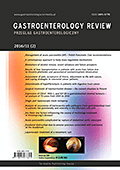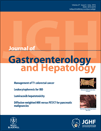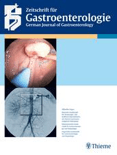
Gastroenterology Review-Przeglad Gastroenterologiczny
Scope & Guideline
Exploring the Frontiers of Digestive Health
Introduction
Aims and Scopes
- Clinical Research in Gastroenterology:
The journal focuses on clinical studies investigating various gastrointestinal diseases, including inflammatory bowel disease (IBD), liver diseases, and gastrointestinal cancers, aiming to improve patient management and treatment outcomes. - Innovative Therapeutic Approaches:
There is a significant emphasis on novel treatment modalities, including biotechnological interventions, dietary therapies, and pharmacological innovations for managing gastrointestinal conditions. - Epidemiological Studies:
The journal publishes research on the epidemiology of gastrointestinal diseases, exploring trends, risk factors, and patient demographics to inform public health strategies. - Microbiome and Gastrointestinal Health:
Research related to the gut microbiome and its influence on gastrointestinal health and disease is a core area, reflecting the growing recognition of the microbiota's role in digestive health. - Interdisciplinary Approaches:
The journal values interdisciplinary research that integrates gastroenterology with other medical fields, such as endocrinology, immunology, and psychology, to provide comprehensive insights into gastrointestinal disorders.
Trending and Emerging
- Impact of COVID-19 on Gastrointestinal Health:
Recent publications have increasingly focused on the effects of the COVID-19 pandemic on gastrointestinal patients, including the implications for treatment and the prevalence of gastrointestinal symptoms in infected individuals. - Role of Gut Microbiota in Health and Disease:
Research examining the gut microbiome's role in various gastrointestinal diseases has gained momentum, underscoring its importance in disease mechanisms and therapeutic interventions. - Personalized Medicine and Biomarkers:
There is a growing interest in personalized medicine approaches, including the identification of biomarkers for disease prediction, treatment response, and patient stratification in gastrointestinal disorders. - Integrative and Holistic Treatment Approaches:
Emerging studies emphasize integrative treatment strategies that combine dietary modifications, probiotics, and lifestyle changes alongside conventional therapies for managing gastrointestinal diseases. - Mental Health and Gastrointestinal Disorders:
The intersection of mental health and gastrointestinal conditions is increasingly being explored, with studies linking psychological factors to disease activity and treatment outcomes in patients with IBD and other disorders.
Declining or Waning
- Traditional Diagnostic Techniques:
There appears to be a decrease in publications focused on conventional diagnostic methods for gastrointestinal diseases, as newer, more innovative diagnostic modalities gain traction. - Case Reports and Rare Conditions:
The frequency of case reports detailing rare gastrointestinal conditions has diminished, possibly due to a shift towards larger cohort studies and clinical trials. - Gastrointestinal Surgery:
Research specifically focused on surgical interventions for gastrointestinal diseases is less prevalent, possibly indicating a trend towards non-invasive or minimally invasive treatment approaches. - Pharmacological Treatments for Common Conditions:
There is a noticeable decrease in studies centered on traditional pharmacological treatments for common gastrointestinal issues, as the field increasingly explores personalized medicine and targeted therapies. - Psychosomatic Aspects of Gastrointestinal Disorders:
Though still relevant, research addressing the psychological aspects of gastrointestinal diseases has become less frequent, reflecting a possible narrowing of focus to more biologically oriented studies.
Similar Journals

JOURNAL OF GASTROENTEROLOGY
Fostering knowledge in gastrointestinal health and treatment.JOURNAL OF GASTROENTEROLOGY, published by SPRINGER JAPAN KK, is a premier academic journal that has been at the forefront of gastrointestinal research since its inception in 1994. With an impressive Impact Factor and ranking in the top quartile (Q1) of its category, this journal holds a significant place in the field of gastroenterology, currently ranked 12th out of 167 in Scopus, placing it in the 93rd percentile. The journal serves as an essential platform for disseminating innovative research, clinical studies, and reviews that foster advancements in the understanding and treatment of gastrointestinal diseases. Although it does not offer Open Access options, it provides researchers, clinicians, and students access to crucial insights and breakthroughs pivotal to improving patient care and outcomes in gastroenterology. With a commitment to high-quality peer-reviewed content, JOURNAL OF GASTROENTEROLOGY plays a vital role in shaping the future of gastrointestinal health and research.

JOURNAL OF GASTROENTEROLOGY AND HEPATOLOGY
Transforming understanding of gastroenterology and hepatology.Welcome to the JOURNAL OF GASTROENTEROLOGY AND HEPATOLOGY, an esteemed publication in the field of gastroenterology and hepatology, proudly published by WILEY. Established in 1986, this journal serves as a crucial platform for researchers, healthcare professionals, and students, presenting groundbreaking research and comprehensive reviews that drive advances in understanding and treating gastrointestinal and liver diseases. With a strong reputation evidenced by its Q1 ranking in gastroenterology and Q2 ranking in hepatology, this journal ranks impressively in the Scopus metrics - positioned at #22 out of 167 in gastroenterology and #21 out of 82 in hepatology, reflecting its contribution to scholarly excellence. Although it does not offer open access options, the journal’s rich archive and diverse topics make it indispensable for those dedicated to improving patient outcomes in these critical areas of medicine. Whether you are a seasoned researcher or an aspiring medical professional, engaging with this journal will keep you at the forefront of the latest developments and emerging trends in gastroenterology and hepatology research.

Minerva Gastroenterology
Fostering Collaboration for Gastroenterological ExcellenceMinerva Gastroenterology, published by EDIZIONI MINERVA MEDICA, is a notable academic journal dedicated to advancing the field of gastroenterology and related disciplines. With an ISSN of 2724-5985 and an E-ISSN of 2724-5365, this journal gathers innovative research from diverse areas including internal medicine, endocrinology, and metabolism. Though characterized by its open-access policies, Minerva Gastroenterology aims to provide a platform for high-quality scholarly articles with an emphasis on critical reviews, clinical studies, and translational research. Since its inception in 2021, the journal has managed to secure a reputation reflected in its Q3 rank across multiple categories in 2023, as well as its standing in Scopus rankings, positioning it in the 45th to 47th percentile among renowned medical journals. Situated in Turin, Italy, it fosters collaboration and knowledge-sharing among researchers and practitioners, making it an essential resource for those seeking to deepen their understanding of gastroenterological conditions and enhance clinical practices.

GUT
Unveiling Insights in Gastroenterology Since 1960GUT is a premier journal in the field of gastroenterology, published by the esteemed BMJ Publishing Group. With a rich history dating back to 1960 and an impressive convergence of research expected to continue through 2024, GUT has established itself as a cornerstone of academic discourse in the gastrointestinal sciences. The journal boasts a remarkable impact factor, positioning it in the Q1 category for gastroenterology with an outstanding rank of #3 out of 167 in its Scopus ranking, reflecting its 98th percentile status among peers. Although it does not currently offer open access options, GUT remains dedicated to disseminating high-quality research, reviews, and clinical studies that advance the understanding of digestive health. Published in the United Kingdom, GUT serves as an essential resource for researchers, clinicians, and students aiming to stay at the forefront of innovations and developments in the field.

ZEITSCHRIFT FUR GASTROENTEROLOGIE
Fostering Innovation in Gastrointestinal MedicineZEITSCHRIFT FUR GASTROENTEROLOGIE, published by GEORG THIEME VERLAG KG, stands as a notable journal in the field of gastroenterology since its inception in 1971. With an ISSN of 0044-2771 and an E-ISSN of 1439-7803, this journal focuses on advancing knowledge and research in gastrointestinal health. Operating from Germany, its contributions span various aspects of gastroenterology, providing a platform for both established and emerging scholars to share their findings. As of 2023, ZEITSCHRIFT FUR GASTROENTEROLOGIE is ranked in the Q3 quartile in Gastroenterology and Q4 in Medicine (miscellaneous), reflecting its critical yet developing role in the academic community. Despite its current Scopus rank of #117 out of 167 in the gastroenterology category, the journal aims to foster innovative research and discussions vital for tackling contemporary challenges in gastrointestinal medicine. While it does not offer open access, the journal's extensive archival rigor ensures that pertinent studies remain accessible to professionals and academicians seeking to deepen their understanding and engage with evolving clinical practices.

United European Gastroenterology Journal
Leading the way in gastrointestinal health innovation.The United European Gastroenterology Journal, published by John Wiley & Sons Ltd, is a leading publication in the fields of gastroenterology and oncology, boasting a distinguished Q1 ranking in both categories for 2023. With an ISSN of 2050-6406 and an E-ISSN of 2050-6414, this journal serves as a vital platform for disseminating cutting-edge research and innovative practices from 2013 to 2024, supporting the advancement of knowledge in gastrointestinal health and cancer treatment. With a commendable Scopus Rank of 14th out of 167 in gastroenterology and 54th out of 404 in oncology, it emphasizes the significance of impactful research in these critical areas. While currently not an open-access journal, it remains a vital resource for researchers, professionals, and students seeking comprehensive insights and evidence-based approaches to improve patient care and clinical outcomes. The United European Gastroenterology Journal is committed to bridging the gap between research and practice, making it an essential reference for those dedicated to the fields of gastroenterology and oncology.

WORLD JOURNAL OF GASTROENTEROLOGY
Championing high-quality studies in gastroenterology.WORLD JOURNAL OF GASTROENTEROLOGY, published by BAISHIDENG PUBLISHING GROUP INC, stands at the forefront of gastrointestinal research, providing a critical platform for the dissemination of high-quality studies in the field. With an impressive impact factor reflected in its Q1 rankings in both Gastroenterology and Miscellaneous Medicine, this journal is recognized for its rigorous peer-review process and commitment to advancing knowledge and practices related to digestive health. Covering comprehensive scopes from clinical advancements to innovative therapies, the journal serves an essential role for researchers, clinicians, and students, enabling them to stay updated on the latest developments and findings from 1998 through 2024. The open access model facilitates broader accessibility, ensuring that groundbreaking research reaches a global audience. The journal's ranking within the top 15% of Scopus demonstrates its significant contribution to the academic community, making it a valuable resource for advancing the science of gastroenterology.

Korean Journal of Gastroenterology
Connecting Disciplines for Gastroenterological ExcellenceKorean Journal of Gastroenterology (ISSN: 1598-9992, E-ISSN: 2233-6869), published by the Korean Society of Gastroenterology, has been a premier outlet for research and advancements in the field of gastroenterology since its inception in 1968. This open-access journal, based in South Korea, fosters a global dialogue on gastrointestinal health, embracing contributions from a diverse array of disciplines within medicine. It is currently ranked in the Q4 quartile for miscellaneous medicine and holds a Scopus rank of #323 out of 636 in general medicine, reflecting its commitment to publishing impactful research despite its relatively recent establishment in high-impact metrics. With a continuous publication timeline extending through to 2024, the journal aims to enhance understanding of gastrointestinal disorders and promote innovative treatments, making it an essential resource for researchers, clinicians, and students alike who seek to stay abreast of the latest developments and clinical applications in gastroenterology.

Frontline Gastroenterology
Transforming Understanding of Gastrointestinal DiseasesFrontline Gastroenterology is a leading academic journal published by the BMJ Publishing Group that plays a vital role in advancing the field of gastroenterology and hepatology. Established in 2013, this prestigious journal has established itself as a significant resource for researchers, healthcare professionals, and students alike, maintaining a commendable impact factor and consistently achieving a Q2 ranking in both gastroenterology and hepatology categories as of 2023. With its focus on disseminating high-quality, peer-reviewed research, Frontline Gastroenterology covers a wide scope of topics pertinent to the understanding, diagnosis, and treatment of gastrointestinal and liver diseases. Although it does not offer Open Access options, its content is accessible through various institutional and personal subscriptions, ensuring that critical findings reach an international audience. As the journal continues to converge into the future, it remains dedicated to fostering innovation and dialogue in gastroenterological sciences.

DIGESTIVE DISEASES AND SCIENCES
Fostering innovation in gastroenterology research.DIGESTIVE DISEASES AND SCIENCES, a renowned journal published by Springer, plays a pivotal role in advancing the fields of gastroenterology and physiology. With a rich publication history spanning from 1979 to 2024, this journal not only holds an impressive Q1 ranking in both categories but also ranks 34th out of 167 in Gastroenterology and 60th out of 193 in Physiology according to Scopus, reflecting its significant impact and reputation within the academic community. Despite being a traditional journal without open access options, it remains a crucial platform for researchers, professionals, and students seeking to disseminate their findings and stay abreast of the latest developments in digestive health. The journal is accessible to a global audience and is dedicated to publishing high-quality, peer-reviewed research, making it an invaluable resource for anyone involved in the study or treatment of digestive diseases.